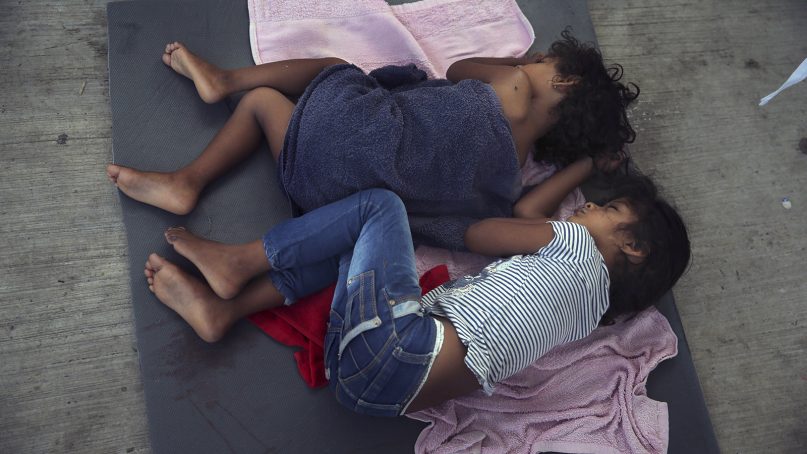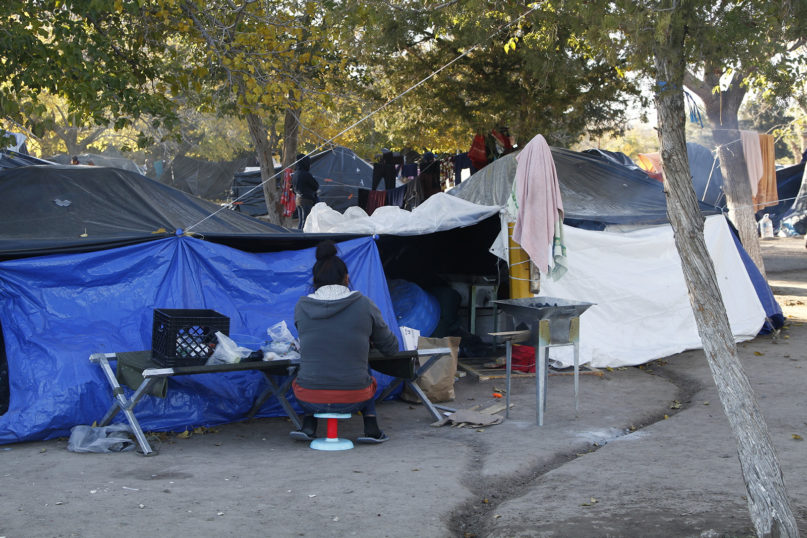(RNS) — Last year, I traveled with two other women across the United States’ southern border and down to Oaxaca, Mexico, where we visited with migrant families traveling to the U.S. from Central America. We knew it wasn’t going to be a feel-good trip, but I don’t think any of us could have understood how despairing our proximity to their pain would be.
We saw families, many with ill children, who are stuck in makeshift camps in Mexico, blocked from medical treatment as they wait to make asylum claims or with hopes of immigrating.
What we found won’t surprise anyone who has followed the immigration crisis over the past few months. What may surprise you is that my companions and I are evangelical Christians.
Political commentators assume that evangelicals blindly give our support to every policy promoted by politicians who fall on the right of the political spectrum, including policies on asylum rights and immigration.
Politicians who subscribe to this belief are missing an opportunity to engage with us.
Particularly among conservative evangelical women, a rich dialogue is developing around how we can best help families seeking refuge here in America. We don’t see immigration as a political issue. We see it as a human dignity issue.
I direct Welcome,, a movement of Christian women who desire to foster and grow Christ-like welcome and biblical hospitality in our country. For me and for many evangelicals, immigrants are first and foremost people made in the image of God and we are compelled to care about their plight.
In Mexico, we got to know mothers like Lorena, traveling from Honduras with her husband and two children after gang violence threatened them at home. Lorena’s family was forced to pick up and leave quickly after her daughter received a Facebook message indicating that gang members were looking for her 16-year-old brother.
They loved Honduras and didn’t want to leave. But Lorena told us you do whatever you need to do in order to keep your children safe.

Migrant children sleep on a mattress on the floor of a migrant shelter in Nuevo Laredo, Mexico, on July 17, 2019. (AP Photo/Marco Ugarte)
Another young mother with a young daughter said she’d had to flee after her sister’s ex-husband slashed her arm and face and threatened to kill them both.
And at a government shelter for minors traveling unaccompanied, we met two mothers, 11 and 14 years old, with infants. They asked us to pray that their children could grow up in the safety of the United States.
For many parents and families, beginning the harrowing journey to America is a last resort born out of trauma and pain. Like any parent, they want their children to grow up with opportunities to thrive. This becomes a distant dream when you’re simply hoping to survive.
We created a short documentary about our trip to Oaxaca with the hope that we could accurately highlight and talk about people, not politics. We hope to remind those on the outside of the immigration issue, whom we know to be pro-life because of their biblical and religious convictions, that a migrant’s life is just as valuable to God as a pre-born’s.
We don’t restore any moral or virtuous social construct when we pit one vulnerable population against another. We can and do care about both.
Many of us feel — likely for the first time — politically homeless. Politicians can appeal to evangelical women by addressing the nuance of this issue. Talk to us about our fears. Acknowledge them with honest and specific solutions. The message must be that while we may not align on every part of a political platform, we can all agree on the inherent dignity of refugees and immigrants.
In his final speech, the Rev. Martin Luther King Jr. said, “The question is not, ‘If I stop to help this man in need, what will happen to me?’ The question is, ‘If I do not stop to help … what will happen to me?’” This is the question many evangelical women are contemplating about their churches, communities and themselves.
The truth is we are concerned and we want to engage. We believe our country can and must do better.

Briana Stensrud. Courtesy photo
Christians, and all Americans, may disagree on the finer points of policy when it comes to immigration reform. But as Christians we must do the hard and sacred work of loving our neighbors well, of loving them as we love ourselves.
(Briana Stensrud is the director of Welcome., a community of Christian women committed to creating a movement of Christ-like welcome in the United States. Follow her on Twitter @BriStenz. The views expressed in this commentary do not necessarily reflect those of Religion News Service.)





